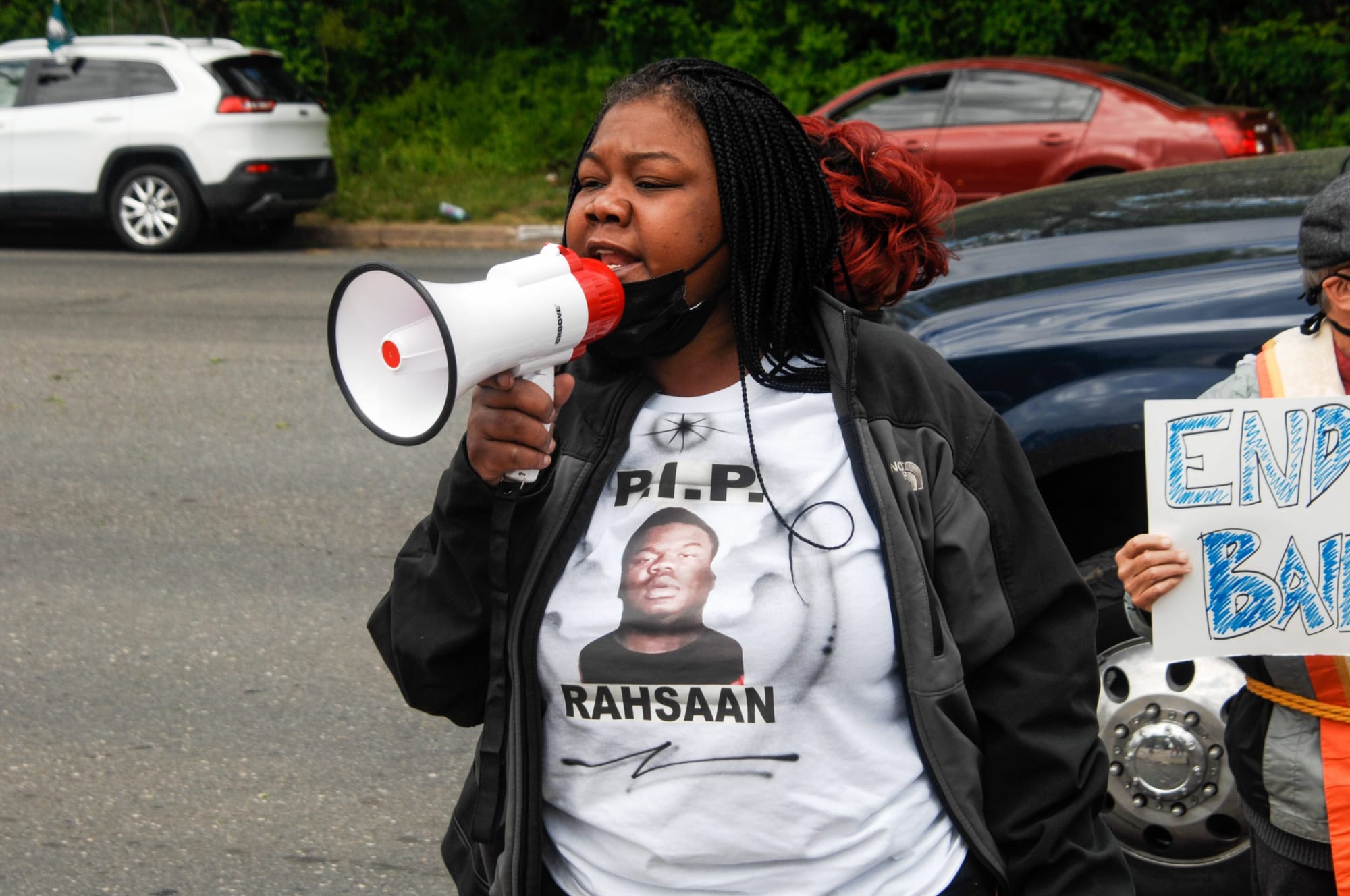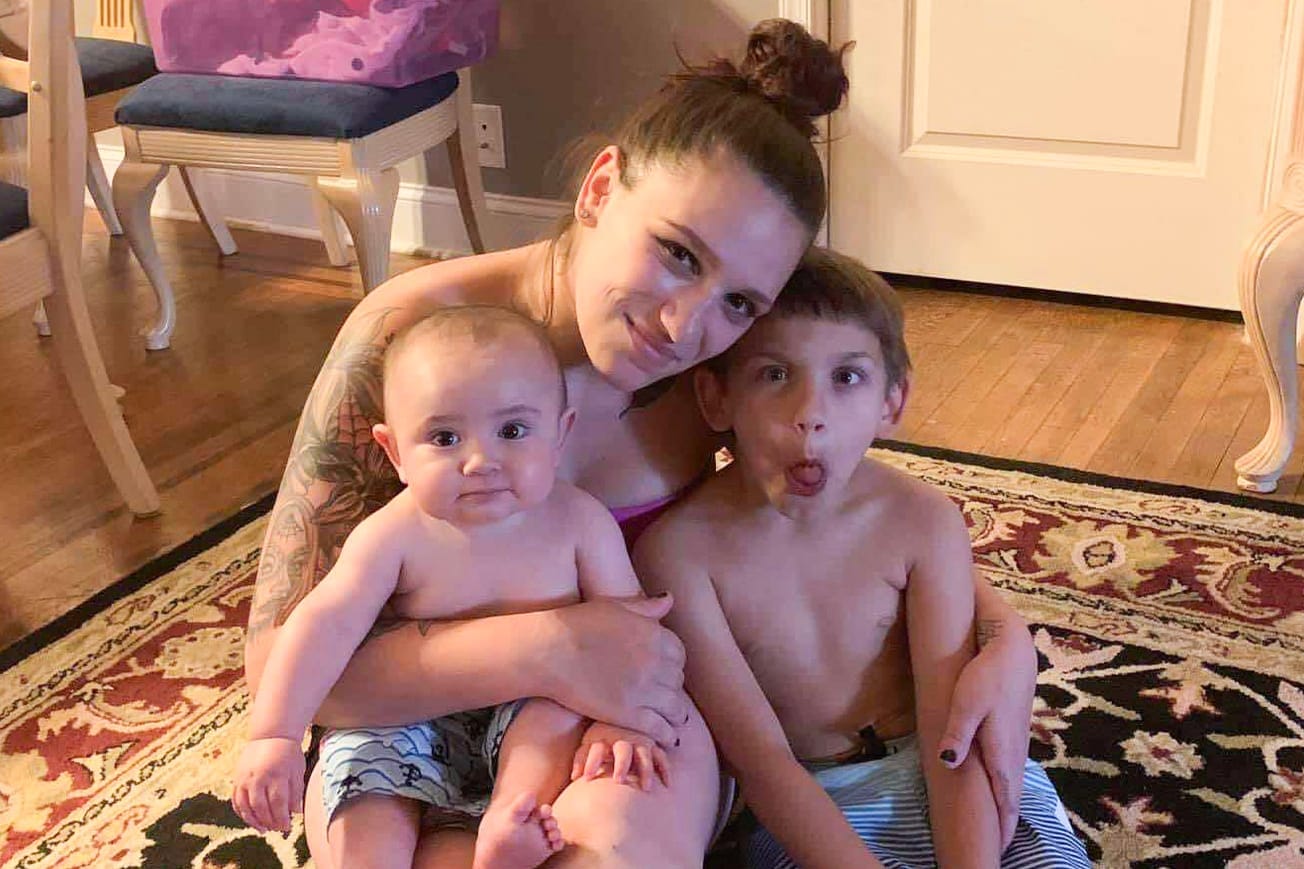Before Amanda Cahill died in a Philly jail cell following a Kensington police sweep earlier this month, “she was screaming” for help and others banged on their cells for hours trying to get her medical attention, according to multiple first-hand accounts from other women who were incarcerated near Cahill.
“I heard her banging on her cell door,” wrote one woman, whose name has been withheld for privacy reasons, in an email to Kensington Voice. “She was screaming ‘help’ for over an hour. We all heard her.”
Three women who were incarcerated inside the Philadelphia Industrial Correctional Center (PICC) shared similar stories with the Abolitionist Law Center (ALC), according to Sam Lew, the Philly jails organizer for ALC. The women told Lew that people in the unit spent hours banging on their cell doors trying to get Cahill medical attention.
“She was definitely suffering enough that [people] were reiterating her calls for help,” Lew said. “They said the banging was so loud that people couldn't sleep,” Lew said. “That means it couldn't have been ignored, except for willfully.”
Cahill, 31, was pronounced dead on Sept. 7 at PICC following a 7:36 a.m. emergency medical services dispatch.
A nurse visited Cahill at 1 a.m., according to a statement released by John Mitchell, communications director for the Philadelphia Department of Prisons. A nurse then found her unresponsive at 7:30 a.m., Mitchell said.
She was incarcerated there after the Philadelphia Police Department arrested her alongside 33 others during a coordinated police sweep under Mayor Cherelle Parker’s Kensington initiative targeting narcotics violations and outstanding warrants.
“My heart breaks to find out that my sister suffered and even more, that other women had to hear this and couldn’t physically help her,” said Amber Clark, Cahill’s sister.

Cahill’s death follows a series of recent warnings from the former prison commissioner, the prison system’s current medical director, and prison reform advocates and abolitionists about the capacity of Philly’s jails to safely handle an influx of arrests and provide adequate medical care for the approximately 4,700 people incarcerated there.
It also follows testimonies from addiction and other local health experts about addiction treatment barriers complicated by an increasingly complex drug supply that has evolved to include fentanyl, xylazine, and most recently medetomidine, a non-opioid veterinary sedative more potent than xylazine.
In August, the Pennsylvania Department of Health released a health advisory about medetomidine that said that in addition to using naloxone to treat suspected overdoses and evidence-based wound care practices for xylazine wounds, treatment providers should be “prepared to manage opioid, xylazine, and/or medetomidine withdrawal symptoms” because “withdrawal symptoms can be life-threatening.”
Cahill’s cousin, Kayden Hujack, said they “don’t believe that Amanda was silent,” given their professional experience working with people going through withdrawal. “Amanda isn't somebody who's gonna neglect asking for help in that type of situation.”
“I don’t believe that silence is a thing,” said Hujack, who previously provided addiction services in carceral settings. “When I was working with people in detox, I've never experienced anybody being silent. That's not something that you grit your teeth and bear through, that's something that you really need help for.”
Mitchell said the prison department would not comment on an active investigation.

Since 2018, at least 26 people have died in Philadelphia’s jails from drug-related incidents, according to a Philadelphia Inquirer analysis.
"The city is always in the process of considering any steps necessary to address the health concerns of people taken into custody; that ongoing process will continue to improve outcomes,” said Joe Grace, spokesperson for the City of Philadelphia and the Parker administration, in a statement last week. “The city will continue to push forward and stabilize conditions in Kensington and other neighborhoods for the people who live there, and that includes using every tool needed that involves prevention, intervention and enforcement, through the Police Department and every other relevant city department."
On Saturday, there was another death inside one of Philly’s jails, the Curran-Fromhold Correctional Facility, according to Mitchell.
“A 61-year-old African-American male was found unresponsive in his cell [at the Curran-Fromhold Correctional Facility] on Saturday morning by a member of the Philadelphia Department of Prisons correctional staff,” Mitchell wrote in a statement.
During the Sept. 14 incident, the prison’s medical staff “administered CPR and began lifesaving measures,” and an emergency response team arrived at the prison at 7:10 a.m. and continued lifesaving measures, according to Mitchell.
The man was pronounced dead at 7:30 a.m.
“Although there is no suspicion of foul play, the matter will still undergo a routine investigation. An exact cause of death is subject to a determination by the Medical Examiner’s Office,” Mitchell said.

‘I’m scared’
If Cahill and others were calling for help for over an hour, Cahill’s family would have a strong legal argument, according to civil rights attorney David Rudovsky, of the firm that recently sued the prisons department over inhumane conditions inside Philly jails.
“That's a serious problem ... that certainly violates [the city’s] own policies,” Rudovsky said.
The city’s police directives require officers to bring someone to the hospital when someone requests medical attention or there is any other evidence that they require medical treatment they cannot receive at the scene of the arrest, Rudovsky said.
According to Rudovsky, medical treatment inside jails is also a constitutional right, and Cahill’s family can sue and claim the prison system ignored her health needs.
“If you're in jail, you're entitled to health treatment,” Rudovksy said.
Lew said this is part of an ongoing pattern inside Philly jails, pointing to another untimely death.
Ebony Chambers, mother of 22-year-old Rahsaan Chambers, is currently suing the city for what she claims was medical neglect that led to Chambers’ death.
According to the lawsuit, on April 6, 2021, Rahsaan Chambers began to have trouble breathing.
“Allegedly, for about 24 hours, [Curran-Fromhold's] staff ignored the many calls for medical attention made by Mr. Chambers and other people incarcerated on his cell block,” the case text states.
The suit alleges that a guard eventually checked on Chambers and then spent nine days at Jefferson Torresdale Hospital. There, he died from severe complications due to a diabetic event.
His cause of death was categorized by the prison system as “natural,” and listed as “complications of diabetic ketoacidosis,” according to city records obtained by Kensington Voice.
“We know that incarcerated people are almost always the first responders when there is violence or medical neglect occurring in the jails,” Lew said. “They are often the ones banging on doors asking for medical attention and so often, they receive none.”
Emergency medical situations make clear that Philly’s jails are “ill-equipped to provide the care that is needed to save peoples’ lives,” Lew said.
The Pennsylvania Prison Society has captured concerns over long wait times and other forms of medical negligence in its quarterly reports the organization publishes about the prison system’s climate.
“We hear regularly from individuals in the prisons about having to wait weeks and even months for medical care,” said Noah Barth, who oversees prison monitoring for the Pennsylvania Prison Society.
During a May City Council committee hearing, Barth described a conversation he had with a man who was incarcerated at PICC with heart conditions and a seizure disorder. Barth said the man told him his in-cell buzzer did not work.
“He was fortunate enough to get along with the guys in the next cell who will bang on the door and scream until help arrives,” Barth said. “No one should have to rely on that. What happens when the next person in that cell isn't so concerned? What happens if they don't scream loud enough?”
Barth ended his testimony by reading direct quotes from incarcerated people his team had interviewed in Philly’s jails.
“The whole week we was locked in, there wasn’t no [corrections officers] around,” Barth said. “Someone could have died here. I’m scared.”

‘She had a chance at recovery’
Now Hujack is determined to hold the city accountable for Cahill’s death.
They want to see the prison system dismantled and rebuilt as one that focuses on the wellbeing of the people inside “instead of causing more trauma which will more than likely result in more offenses, setting these individuals up for failure instead of success,” they said.
“People are going to know that prison's name, because it seems to me that it's so understaffed, it needs to be shut down,” Hujack said. “The whole system needs to be brought down, destroyed.”
The Defenders Association of Philadelphia said the city must invest in solutions that “treat addiction as a medical condition, not a crime,” in a statement following Cahill’s death.
"We once again urge the city to reevaluate its current strategies and work with us and our community partners to find evidence-based solutions that genuinely address the root causes of addiction. Instead of a system that criminalizes our most vulnerable residents, let’s work together to build one that protects them—and their communities—in their most vulnerable moments," the organization wrote.
Hujack would like to speak with others who were incarcerated near Cahill at the time of her death.
“I feel so sorry that they had to go through this,” Hujack said. “And they too, deserve adequate treatment and to have all medical, physical, emotional needs met while being held in custody.”
Cahill was both book and street smart, and she had dreams and aspirations, they said.
“She had a chance at recovery,” said Hujack. “Was it right at this moment? Maybe not. But they robbed her of any chance.”

Have any questions, comments, or concerns about this story? Send an email to editors@kensingtonvoice.com.





